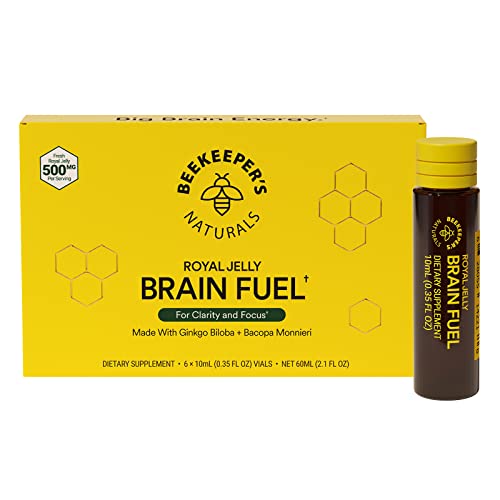
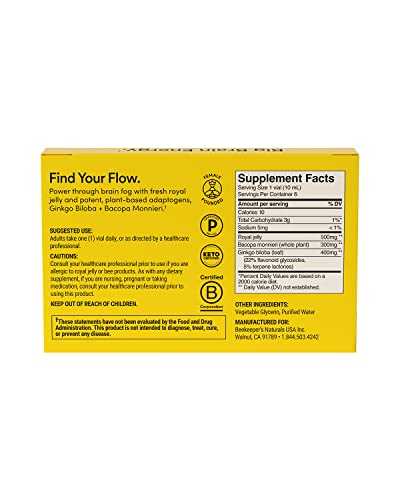
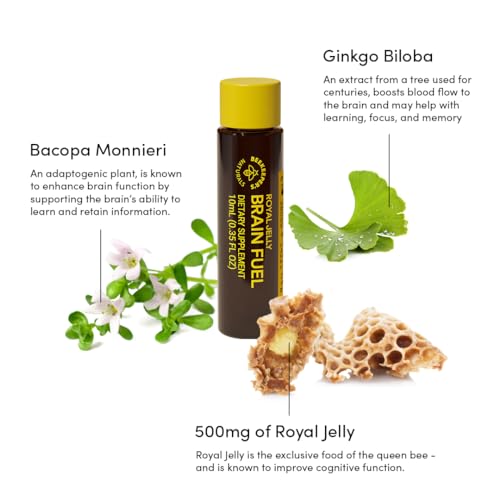


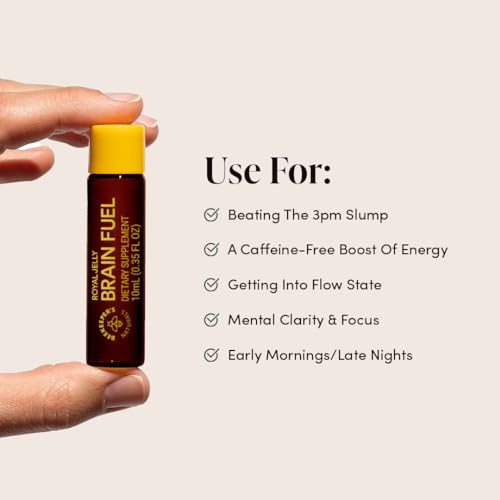
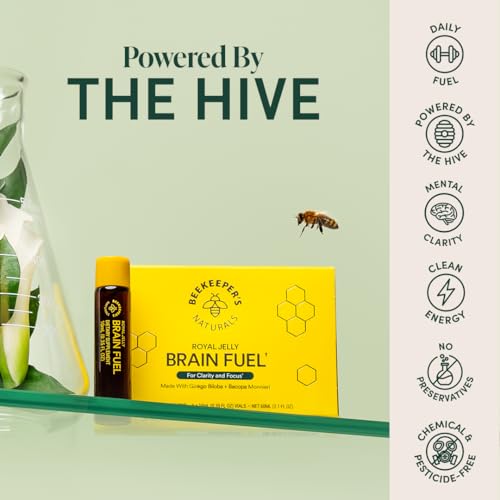
BEEKEEPER'S NATURALS B.LXR Brain Fuel - Memory, Focus & Clarity, Caffeine-Free - 6 Ct


Royal Jelly
Medium RiskRoyal jelly is a pharyngeal secretion of worker bees that serves as a crucial nutrient source for the queen bee and larvae. It is rich in proteins, vitamins, and minerals, often used in dietary supplements and cosmetics for its purported health benefits.
Sustai Insights
Royal jelly offers functional benefits such as nutritional support and potential anti-inflammatory properties. It is generally low risk for carcinogenicity and developmental toxicity, but carries moderate concerns regarding allergenic potential. Environmental risks are minimal, with no significant pollutant or bioaccumulation issues identified. Regulatory status is typically approved, but caution is advised for individuals with bee-related allergies. Overall, the ingredient presents a medium risk profile, warranting careful consideration in sensitive applications.
Triticum Vulgare (Wheat) Gluten
Medium RiskTriticum vulgare (wheat) gluten is a protein derived from wheat that functions primarily as a binding agent in various food and cosmetic products. It provides texture and elasticity, making it a common ingredient in baked goods and some personal care items.
Sustai Insights
Wheat gluten offers functional benefits such as enhancing product texture and acting as a stabilizer. However, it poses moderate allergenic risks, particularly for individuals with gluten sensitivity or celiac disease. Environmental concerns are low, with no significant pollutant potential noted. Regulatory bodies do not impose major restrictions, but products must be clearly labeled for consumer safety. Overall, the risk level is assessed as medium. Safe usage practices should be observed, especially for sensitive populations, and alternatives like pea protein or other plant-based binders may be considered.
Sucrose
Low RiskSucrose is a naturally occurring disaccharide, commonly known as table sugar. It is derived from various plants, primarily sugar cane and sugar beet, and serves as a sweetening agent in a variety of food and cosmetic products.
Sustai Insights
Sucrose is effective as a sweetener and humectant, providing moisture retention in formulations. It is biodegradable and generally recognized as safe, with low concerns regarding carcinogenicity, allergies, and reproductive toxicity. However, excessive consumption can lead to health issues like obesity and diabetes. Environmentally, sucrose poses minimal pollution risk and is not bioaccumulative. Regulatory bodies do not impose significant restrictions on its use. Overall, sucrose presents a low risk when utilized appropriately.
Glycine Soja (Soybean) Oil
Low RiskGlycine soja (soybean) oil is derived from the seeds of the soybean plant and is commonly used in cosmetic formulations for its emollient properties. It functions as a moisturizer and skin conditioning agent, enhancing the texture and feel of products.
Sustai Insights
Glycine soja (soybean) oil offers functional benefits such as effective skin moisturization and conditioning. It is generally recognized as low-risk for health concerns, with minimal allergenic potential and no significant environmental hazards reported. Regulatory bodies have not imposed restrictions on its use. Overall, this ingredient is assessed as low risk, making it a suitable option for various cosmetic applications.
Zea Mays (Corn)
Low RiskZea mays (corn) fruit is derived from the plant Zea mays. It is commonly used in various cosmetic formulations for its functional properties, including acting as a humectant and providing texture in products.
Sustai Insights
Zea mays offers functional benefits such as moisture retention and improved product texture. It is considered safe with low health risks, including minimal concerns regarding carcinogenicity, allergies, or reproductive toxicity. Environmentally, it poses low risks, with no significant pollutant or bioaccumulation potential. Regulatory assessments do not indicate any restrictions. Overall, the ingredient is assessed as low risk, making it a viable option in cosmetic formulations.
Yeast
Low RiskYeast is a class of microorganisms from the Hemiascomycetes subphylum, widely used in food production and fermentation processes. It functions primarily as a leavening agent in baking and as a fermenting agent in brewing and winemaking. Yeast also plays a role in the production of certain dietary supplements.
Sustai Insights
Yeast serves as an effective leavening agent and contributes to fermentation, enhancing flavor and texture in foods. It is considered low risk regarding health concerns, with minimal associations with carcinogenicity, allergies, or reproductive toxicity. Environmentally, yeast is not a pollutant and does not bioaccumulate. Regulatory bodies, including the FDA, have no specific restrictions on its use. Given the low risk profile, yeast is a safe ingredient; however, individuals with specific allergies should consult health professionals. Alternatives like baking soda or sourdough starters may be considered for specific applications.
Egg
Low RiskEgg is the entire content of chicken eggs, commonly used as an ingredient in various products for its nutritional and functional properties.
Sustai Insights
Eggs are known for their functional benefits, including serving as a binding agent and providing protein. They are typically sustainably sourced and biodegradable. Health risks are considered low, with minimal concerns regarding carcinogenicity, allergies, or reproductive toxicity. Environmental risks are also low, with no significant pollutant potential. Regulatory bodies do not impose current restrictions on egg usage. Overall, the risk level is low, and safe usage practices should be observed, though alternatives like plant-based substitutes may be considered for those with allergies.
Triticum Vulgare (Wheat)
Low RiskTriticum vulgare, commonly known as wheat, is a cereal grain primarily used in food products and various cosmetic formulations. It serves as a source of carbohydrates and can also function as a binding agent, thickener, or emulsifier in formulations. Wheat is widely recognized for its role in nutrition and its diverse applications in the food industry.
Sustai Insights
Triticum vulgare offers functional benefits as a binding agent and source of carbohydrates, with sustainable attributes if sourced responsibly. Health risks are low, with minimal concerns regarding carcinogenicity, allergies, or reproductive toxicity. Environmental risks, including pollution potential, are also low. Regulatory bodies do not currently impose restrictions on its use. Overall, the risk level associated with this ingredient is low, making it a safe choice for both consumers and the environment.
Sucrose
Low RiskSucrose is a naturally occurring disaccharide, commonly known as table sugar. It is derived from various plants, primarily sugar cane and sugar beet, and serves as a sweetening agent in a variety of food and cosmetic products.
Sustai Insights
Sucrose is effective as a sweetener and humectant, providing moisture retention in formulations. It is biodegradable and generally recognized as safe, with low concerns regarding carcinogenicity, allergies, and reproductive toxicity. However, excessive consumption can lead to health issues like obesity and diabetes. Environmentally, sucrose poses minimal pollution risk and is not bioaccumulative. Regulatory bodies do not impose significant restrictions on its use. Overall, sucrose presents a low risk when utilized appropriately.
Royal Jelly
Medium RiskRoyal jelly is a pharyngeal secretion of worker bees that serves as a crucial nutrient source for the queen bee and larvae. It is rich in proteins, vitamins, and minerals, often used in dietary supplements and cosmetics for its purported health benefits.
Sustai Insights
Royal jelly offers functional benefits such as nutritional support and potential anti-inflammatory properties. It is generally low risk for carcinogenicity and developmental toxicity, but carries moderate concerns regarding allergenic potential. Environmental risks are minimal, with no significant pollutant or bioaccumulation issues identified. Regulatory status is typically approved, but caution is advised for individuals with bee-related allergies. Overall, the ingredient presents a medium risk profile, warranting careful consideration in sensitive applications.
Glycine Soja (Soybean) Oil
Low RiskGlycine soja (soybean) oil is derived from the seeds of the soybean plant and is commonly used in cosmetic formulations for its emollient properties. It functions as a moisturizer and skin conditioning agent, enhancing the texture and feel of products.
Sustai Insights
Glycine soja (soybean) oil offers functional benefits such as effective skin moisturization and conditioning. It is generally recognized as low-risk for health concerns, with minimal allergenic potential and no significant environmental hazards reported. Regulatory bodies have not imposed restrictions on its use. Overall, this ingredient is assessed as low risk, making it a suitable option for various cosmetic applications.
Zea Mays (Corn)
Low RiskZea mays (corn) fruit is derived from the plant Zea mays. It is commonly used in various cosmetic formulations for its functional properties, including acting as a humectant and providing texture in products.
Sustai Insights
Zea mays offers functional benefits such as moisture retention and improved product texture. It is considered safe with low health risks, including minimal concerns regarding carcinogenicity, allergies, or reproductive toxicity. Environmentally, it poses low risks, with no significant pollutant or bioaccumulation potential. Regulatory assessments do not indicate any restrictions. Overall, the ingredient is assessed as low risk, making it a viable option in cosmetic formulations.
Yeast
Low RiskYeast is a class of microorganisms from the Hemiascomycetes subphylum, widely used in food production and fermentation processes. It functions primarily as a leavening agent in baking and as a fermenting agent in brewing and winemaking. Yeast also plays a role in the production of certain dietary supplements.
Sustai Insights
Yeast serves as an effective leavening agent and contributes to fermentation, enhancing flavor and texture in foods. It is considered low risk regarding health concerns, with minimal associations with carcinogenicity, allergies, or reproductive toxicity. Environmentally, yeast is not a pollutant and does not bioaccumulate. Regulatory bodies, including the FDA, have no specific restrictions on its use. Given the low risk profile, yeast is a safe ingredient; however, individuals with specific allergies should consult health professionals. Alternatives like baking soda or sourdough starters may be considered for specific applications.
Egg
Low RiskEgg is the entire content of chicken eggs, commonly used as an ingredient in various products for its nutritional and functional properties.
Sustai Insights
Eggs are known for their functional benefits, including serving as a binding agent and providing protein. They are typically sustainably sourced and biodegradable. Health risks are considered low, with minimal concerns regarding carcinogenicity, allergies, or reproductive toxicity. Environmental risks are also low, with no significant pollutant potential. Regulatory bodies do not impose current restrictions on egg usage. Overall, the risk level is low, and safe usage practices should be observed, though alternatives like plant-based substitutes may be considered for those with allergies.
Triticum Vulgare (Wheat) Gluten
Medium RiskTriticum vulgare (wheat) gluten is a protein derived from wheat that functions primarily as a binding agent in various food and cosmetic products. It provides texture and elasticity, making it a common ingredient in baked goods and some personal care items.
Sustai Insights
Wheat gluten offers functional benefits such as enhancing product texture and acting as a stabilizer. However, it poses moderate allergenic risks, particularly for individuals with gluten sensitivity or celiac disease. Environmental concerns are low, with no significant pollutant potential noted. Regulatory bodies do not impose major restrictions, but products must be clearly labeled for consumer safety. Overall, the risk level is assessed as medium. Safe usage practices should be observed, especially for sensitive populations, and alternatives like pea protein or other plant-based binders may be considered.
Triticum Vulgare (Wheat)
Low RiskTriticum vulgare, commonly known as wheat, is a cereal grain primarily used in food products and various cosmetic formulations. It serves as a source of carbohydrates and can also function as a binding agent, thickener, or emulsifier in formulations. Wheat is widely recognized for its role in nutrition and its diverse applications in the food industry.
Sustai Insights
Triticum vulgare offers functional benefits as a binding agent and source of carbohydrates, with sustainable attributes if sourced responsibly. Health risks are low, with minimal concerns regarding carcinogenicity, allergies, or reproductive toxicity. Environmental risks, including pollution potential, are also low. Regulatory bodies do not currently impose restrictions on its use. Overall, the risk level associated with this ingredient is low, making it a safe choice for both consumers and the environment.
Unlock your potential with BEEKEEPER'S NATURALS B.LXR Brain Fuel, a powerful liquid formula designed to enhance memory, focus, and clarity. This caffeine-free brain supplement is perfect for those looking to boost productivity without the jitters or crashes associated with traditional stimulants.
- Natural Focus and Memory Support: Packed with adaptogens like royal jelly and bacopa monnieri, this formula enhances cognitive function, making it ideal for studying or creative projects.
- Stress-Fighting Formula: Antioxidant-rich and caffeine-free, B.LXR helps combat brain fog and jet lag, promoting sustained energy throughout the day.
- Clean, Healthy Ingredients: Certified Keto and Paleo, this supplement contains no artificial preservatives or allergens, ensuring a clean boost for your brain health.
- Third-Party Tested: Each batch is rigorously tested for purity and potency, ensuring you receive a product free from pesticides and harmful chemicals.
- Easy to Use: Simply take half to one vial daily for optimal benefits. Incorporate it into your routine alongside a balanced diet for best results.
Subscribe & Save with Sustai
- Best Price Guarantee: Always enjoy the lowest prices on sustainable home essentials.
- No Surprises: We’ll notify you before shipping. No hidden fees, ever.
- You’re in Charge: Change, pause, or cancel your subscription anytime with ease.
- Eco-Friendly Deliveries: Our grouped shipments mean less packaging and lower emissions.
Join us on a sustainable journey. Special offers for a limited time! Prices and promotions may change.
Recommended Products
Unlock your potential with BEEKEEPER'S NATURALS B.LXR Brain Fuel, a powerful liquid formula designed to enhance memory, focus, and clarity. This caffeine-free brain supplement is perfect for those looking to boost productivity without the jitters or crashes associated with traditional stimulants.
- Natural Focus and Memory Support: Packed with adaptogens like royal jelly and bacopa monnieri, this formula enhances cognitive function, making it ideal for studying or creative projects.
- Stress-Fighting Formula: Antioxidant-rich and caffeine-free, B.LXR helps combat brain fog and jet lag, promoting sustained energy throughout the day.
- Clean, Healthy Ingredients: Certified Keto and Paleo, this supplement contains no artificial preservatives or allergens, ensuring a clean boost for your brain health.
- Third-Party Tested: Each batch is rigorously tested for purity and potency, ensuring you receive a product free from pesticides and harmful chemicals.
- Easy to Use: Simply take half to one vial daily for optimal benefits. Incorporate it into your routine alongside a balanced diet for best results.

You can have at most 2 Sustainable Steals products in your cart
Customer Reviews
Customers’ View
Customers generally appreciate the effectiveness of this brain supplement, often noting its ability to enhance focus and clarity. Many users report that it helps clear brain fog and boosts energy levels, making it particularly useful for tasks requiring concentration. One customer mentioned, "B.LXR definitely lifted the fog, my mind felt clearer almost immediately." Additionally, the product's natural ingredients align with health-conscious values, as it is caffeine-free and free from artificial additives. Some customers, however, express concerns about the product's price and have mixed feelings about its taste, with remarks ranging from pleasant to unappealing. Overall, this supplement is seen as a beneficial addition for those seeking improved cognitive function while maintaining an eco-friendly lifestyle.
AI-generated from the text of customer reviewsThis product has no reviews yet.





